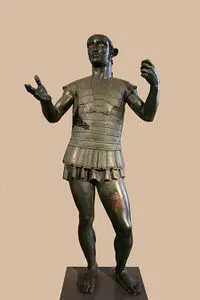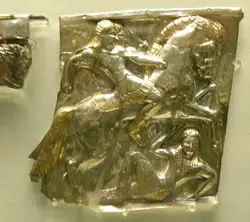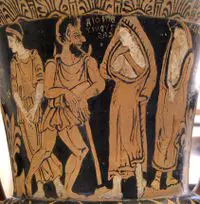what contributions did the etruscans make to roman civilization

A statue of an Etruscan nobleman or deity
The Etruscan civilisation was an early on civilization (900 BCE-100 BCE) that inhabited Italy from Tuscany to Rome. It is little known and was largely forgotten until archaeological discoveries in one case revealed its power, complexity, and sophistication. The Etruscans had a unique civilization and culture.
Yet, they made a decisive contribution to the history of Europe, considering they shaped in many means the early evolution of Rome. Many of the virtually distinctive features of Roman society were in fact influenced by, or directly borrowed from the Etruscans. The Etruscans were a formative influence on Rome and this tin be seen in its religion, civilization, urban planning, and engineering science and they also helped to establish it as a great city and one of the greatest powers in Italy. In order to understand Rome, it is necessary to understand the influence of the Etruscans on the Early Roman Republic.
Who were the Etruscans?

The Etruscans resided in ancient Italia in mod Tuscany and northern Lazio. They flourished in this area from 1000 BCE to 100 BCE.[1] They had a unique language and civilisation. Etruscan society appears to accept been one where a warrior aristocracy ruled a big rural population. This changed over time as the Etruscans became more sophisticated and rich and oligarchies dominated Etruria. The wealth of the Etruscan people was based on their rich natural resource. Etruria was rich in copper and gold and the landscape was dotted with mines.
The Etruscans also had a good degree of technical know-how and they were renowned for their metalworking and their pottery skills. They were also expert sculptors and artists. The Etruscans as they were likewise known were proficient seafarers and sailed throughout the western Mediterranean. From the 7th century BCE, they came into contact with Greek and Punic Civilizations and many Greeks even settled in Etruria.[2]
Why did the Etruscans fight the Greeks?
The Etruscans regularly fought the Greeks for control of the sea lanes. The Etruscans were never a coherent political unit but rather existed as independent city-states. The Etruscans were united by a common culture and religion. Despite this the diverse Etruscan city-states were distinctive.[three] The coastal cities were generally much more cosmopolitan than those located in the interior. Past the seventh century BCE, various Etruscan city-states united in a loose political and military league.
The Etruscans were formidable soldiers and copied the Hoplite tactics and weaponry of the Greeks. This allowed them to dominate a big area of Italy from the Po Valley to the area around Naples. But the Greek urban center-states in Magna Graecia (southern Italy) defied their armies in Italia. The Etruscans could conquer the city of Rome and their dominance was so complete that a dynasty of Etruscan kings the Tarquinii, ruled the city for much of the sixth century BCE. During this period the city of Rome grew rapidly and it is possible that many Etruscans came to live in the city. The Romans were culturally and ethnically dissimilar from the Etruscans.[iv]
The early inhabitants of Rome were Latins and spoke an early form of the Latin language. During the reign of the Tarquinii kings, Rome was part of the Etruscan globe and very much influenced by its civilization. From the fifth century BCE the Etruscans went into political and economic reject. Celtic tribes from the north invaded Etruria and sacked several cities. The Greeks at the sea-boxing of Cumae defeated the Etruscan fleets and came to dominate the body of water lanes and this led to economic reject in many Etruscan states. The Etruscan League of Metropolis-States was severely weakened and this allowed the Roman to first expel the Etruscan dynasty and uniting the Latin peoples of central Italian republic.
Why were the Etruscans raided by Rome and the Celtic raiders?
The Etruscans were constantly harried past Celtic raids and attacks from the north and from the south they were under force per unit area from Rome. For about 150 years Rome and the Etruscans fought intermittent wars.[5] Rome developed a sophisticated armed services and increasingly was able to defeat the Etruscans in battle. In 406 BCE, the Romans took the key Etruscan city of Veii after a lengthy siege allowed Rome to expand into Etruria. There were many years of peace between the Romans and the Etruscans and they even occasionally allied with each other against the Celts. In 295 BCE the Roman legions defeated a coalition of Etruscan states at the Battle of Sentium. The Romans pressed home their advantage and in one year alone, (280 BCE) they captured three large Etruscan city-states.
In 273 BCE, the city of Cerveteri fell and this was the terminal independent Etruscan urban center-country. The Romans established armed forces colonies in Etruria and this began a process of Romanization and gradually Etruscan culture began to disappear. Many Etruscan cities were destroyed by Sulla and his army during his war with Marius the and by l BCE the Etruscans had about disappeared from history and it seems that they had become thoroughly Romanized.[6]
What office did the Etruscans play in the growth of Rome?

A scene from Etruscan mythology
Sometime around 650 BCE, the Etruscans seized control of Rome, then piddling more than than a poor settlement of shepherds and small farmers. The site of Rome made information technology very attractive to the Etruscans as it was situated on a series of hills that were very easy to defend and it was located nearly an important ford in the Tiber. There was besides some salt works nearby and this was an important economical asset in the aboriginal world. The Etruscans apparently seized complete command of the city, withal, it is impossible to exist sure what is a myth and what is history in this era. The Etruscans kings who ruled the city were the Tarquinii.
Co-ordinate to the Histories of Livy, Tarquinius Priscus was the first Etruscan king of Rome and he succeeded the terminal Latin king. He was an aggressive and warlike king and he expanded the territory of Rome. He was subsequently assassinated past a Roman aristocrat. Servius Tullius was the next king and he was an able leader and he made Rome the leading urban center in the Latin league and the nearly powerful entity in primal Italia.[7] The later kings of Rome are shown in the histories of Livy and others as barbarous tyrants. The final Etruscan King was expelled because of his tyranny and brutality.
Despite beingness controlled by a not-Roman dynasty the city grew in power and prestige. The Etruscans ensured that the Romans were the leaders of the Latin people. This and the territory that was added past the Etruscan kings was very important in the evolution of Rome and these monarchs laid the foundations for the future Roman domination of Italy. They left an enduring legacy in the symbols of ability in Rome. From the royal insignia of the Etruscans came such symbols equally the fasces (bundle of sticks) and the ax.[8] These were subsequently adopted past Republican Rome and remained part of the formalism life of the city, until the rise of the Papacy in the wake of the fall of the Roman Empire.

What did the Etruscan Kings practice to develop Rome?
The Etruscan kings were great builders and they transformed Rome from a rude settlement of huts and uncomplicated dwellings into a true city. The monarch probably introduced Etruscans builders and architects into the city. The Etruscans were great engineers and they were outstanding builders. Apparently, the Romans learned much from the Etruscans and the famed Roman expertise in urban planning and engineering originated with their northern neighbors during the monarchy of the Tarquinii.[9]
The Roman architectural style in the Roman Democracy was heavily influenced by the Etruscans. The Tarquinii monarchs build a series of sewers in Rome and this fabricated the metropolis more hygienic and allowed the city to grow and prosper. The kings also drained many of the marshes that surrounded the city over several years and this allowed more than land to be cultivated to feed the growing population of Rome.
Many of the nearly distinctive buildings and public works can be traced to the Etruscan menstruum. The city greatly expanded and this meant that new walls had to be built to protect the population. The Tarquins built the Servian Walls and they too fortified some of the other hills around the city. They eventually build a single fortification that enclosed the entire city, these were the Servian Walls.[ten] These walls were and so well built that they protected the city for several hundred years. The Etruscans besides built many well-known Temples such every bit the temple of Jupiter. It seemed that they also introduced the vault and the arch into Roman architecture. They are also widely credited with building the beginning Forum, Rome's primary public infinite.
What was the relationship betwixt the Etruscans and the Greeks?
The Etruscans had long had contacts with the Greeks and their alphabet was based on their alphabet. The city-states of Etruria had long been under the cultural influence of the Greeks.[11] The Tarquin kings the Etruscans exposed the Romans to Greek culture. Many Roman nobles would ship their sons to schools in Etruscan cities and hither they learned Greek and read its literature and philosophy[12]
Greek thought and literature enriched Roman culture. The Romans adopted the Greek alphabet and used information technology for their own language, Latin. Much of Roman literature was based on Greek forms and genres and Roman political thought and philosophy originated in Greek ideas. By the second century BCE many the male aristocracy could speak Greek and many were educated in Athens.[13]
How did Etruscan religion influence Roman Religion?
Little is known most the nature of Etruscan religion but many writers accept declared it to be 'gloomy'. It seems that the exact influence of Etruscan religion and myths on Rome will never be known. Information technology seems that the Romans did adopt some Etruscan deities and demons. These demons were eventually transmitted to the Christians.[14]
The Etruscans were renowned for their oracles and prophecies. Ane of the Tarquin kings purchased the Syballine books, which became the prophetic literature of Rome from an Etruscan temple. Oracles played a very important part of the religion of Rome.[15]
Many of these oracles were of Etruscan origin and these were known every bit the Haruspices. This was the fine art of interpreting the will of the Gods. Soothsayers from Etruria were very much in need and seemed to have passed on their skills to the local Roman priests. The Etruscan soothsayers could allegedly understand the will of the Gods by observing miracle such as lightning. Another Etruscan method for understanding the wishes of the Gods was the examination of the internal organs of sacrificed animals. One of the more than curious Etruscan traditions was the observation of the manner some sacred chickens ate their food to understand the divine volition. Even later on the Etruscan kings were expelled the Romans still respected the oracles of the Etruscans. The Roman Senate ordained that the Etruscan oracles and ceremonies exist maintained in perpetuity by the land and they were practiced by Roman priests until the Christian era.[16]
What part did the Etruscans do to make Gladiators popular?
The Etruscan organized religion, had ane unexpected influence on Rome and that was the development of the custom of gladiator contests. Information technology appears that it was a custom among many Etruscan urban center-states that they forced men to fight to the expiry at the funeral of a noble or a king. The men normally fought to the death and the blood of the slain fighter was a sacrifice to the deities of the underworld. The Romans seemed to have adopted this custom former during the period of the Tarquin kings.
The Romans largely secularized the custom of men fighting although it retained some religious symbolism such as the presence of an attendant dressed as the divinity Hermes.[17] The Romans over the grade of the centuries took what was substantially an Etruscan religious ceremony and turned it into a gory public sporting upshot.
Decision
The Etruscans were in many ways the predecessors of the Romans. They influenced the young metropolis-state in many ways. The Etruscans' civilisation exposed the Romans to the ideas of the Greeks and new religious practices. The Etruscans taught the Romans both engineering and edifice skills. They besides decisively influenced the classical Roman architectural manner. They besides developed the economic system of the urban center, for instance by draining the marshes side by side to Rome.
The era of the Etruscan monarchs is often portrayed equally a period of tyranny all the same these kings expanded the city and its territory and made it the leading power in central Italy. It is arguable that the Etruscans paved the way for the Romans to become a power in Italy and in the Mediterranean.
References
- ↑ Torelli, Mario, The Etruscans. (Rome Rizzoli International Publications, 1997), p. five
- ↑ Franklin-Hall, John. Etruscan Italian republic: Etruscan Influences on the Civilizations of Italy. (Indiana University Press, 1997), p. 15
- ↑ Franklin-Hall, p. 114
- ↑ Franklin-Hall, p. 114
- ↑ Franklin-Hall, p. 114
- ↑ Franklin-Hall, p. 117
- ↑ Franklin-Hall, p. 119
- ↑ Livy v, half dozen
- ↑ Franklin-Hall, p. 194
- ↑ Lorenzi, Rossella. "Unraveling the Etruscan Enigma." Archaeology 63, no. half dozen (2010): 36-43
- ↑ Ullman, B. L. "The Etruscan Origin of the Roman Alphabet and the Names of the Letters." Classical Philology 22, no. 4 (1927): 372-77
- ↑ Livy. 5. xiv
- ↑ Franklin-Hall, p. 115
- ↑ Bonfante, Larissa. "An Etruscan Demon in Pompeii." In KOINE: Mediterranean Studies in Honor of R. Ross Holloway, edited by Counts Derek B. and Tuck Anthony S., 96-99. (Oxford; Oakville: Oxbow Books, 2009), p. 97
- ↑ "Gods in Harmony: The Etruscan Pantheon." In The Faith of the Etruscans, edited by Simon Erika, De Grummond Nancy Thomson, and Simon Erika, (Academy of Texas Printing, 2006), p. 45
- ↑ Franklin-Hall, p. 119
- ↑ Bennett, Joseph. "The Gladiators." The Hudson Review 12, no. 2 (1959): 167-74
Admin, Ewhelan and EricLambrecht
waddingtonuntoonesch.blogspot.com
Source: https://dailyhistory.org/How_did_the_Etruscans_shape_Roman_history_and_society
0 Response to "what contributions did the etruscans make to roman civilization"
Post a Comment